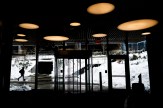Bringing water to the world
A team of Northeastern students is getting hands-on training as they work to improve conditions in a poor Ugandan village. They’re also gaining eye-opening perspective on life in parts of this African nation.
In late April, students from Northeastern’s chapter of Engineers Without Borders traveled to Bbanda, Uganda, about 72 miles west of the capital, Kampala, to gather data for designing a clean-water distribution system. The trip was funded by Friends of the Sick and Poor, a Dorchester, Mass.-based community organization working to repair the devastation caused by Bbanda’s AIDS epidemic.
During their time in Uganda, the students evaluated the water supply, conducted door-to-door surveys on local health practices, mapped the town using a GPS tracking device, and met with hundreds of community leaders, parents, teachers, and children to better understand the needs of villagers.
Bbanda’s scarce, bacteria-infested water supply affects the health and quality of life of its 1,500 citizens, many of whom also suffer from malaria. Just how deep an affect it has on the social, as well as physical, health of the Bbanda people surprised team members.
“I went to Uganda thinking that if the villagers had an education, they could do their own projects and advance their village on their own,” explains civil engineering student Matt Walsh. “But that will be tough because kids spend so much time out of school either because of water-related illnesses or because they’re walking three, four, five miles a day, filling and carrying 5-gallon, 40-pound jugs of water.”
Revitalizing the village has to start with water, says Walsh. But formulating a plan to improve the community’s quality of life will not be easy. Its limited water supply and the location of villagers’ homes make it difficult to build an effective, efficient pipeline system.
“In Africa, homes tend to be spread out,” explains team mentor and Northeastern alumnus Dan Saulnier. “If you pipe water to homes, you use a lot more than if you have water at a source that people come to and use. And if water runs out, people are in trouble.”
Back at Northeastern, students are exploring design options that include harvesting rainwater, drilling wells, and installing community tap stands throughout the village. “We need to find out how to get water close enough so people don’t have to spend all their time carrying it home, but not so close that they use it all and none is left,” says Saulnier.
The team is relying on experience they gained in El Chaguite, Honduras, where Engineers Without Borders has also traveled to build a clean-water pipeline. The Honduras project will be completed in August when students return for the third time to install personal taps in all homes and build a storage tank. A board of overseers will sustain the project once it’s complete—a sustainability model that students hope the Bbandan villagers will adapt when their system is in place.
“The people we worked with are incredibly self-sufficient,” says chapter president Lucas Johnson of the Bbandan people. Johnson is a senior mechanical engineering student who also worked on the Honduran water project. “But they need the technical expertise and the education.”
One thing Bbandans seem to have in spades is optimism and a will to succeed. Several team members note the upbeat personalities and overwhelming hospitality of their hosts.
“When the TV touches on the third world, you hear grim music and see sad children,” explains sophomore engineering major Charlotte Alger when comparing her own expectations of Uganda with the reality of her experience. “But when we got there, people were having fun and were really warm and welcoming to complete strangers.”
Students describe their Engineers Without Borders experiences as not only eye-opening, but as life-changing. In fact, Johnson cites it as his most fulfilling experience as a student at Northeastern and one that has inspired him to explore a career in world development. “We’ve gained a lot of technical knowledge and we’ve learned a lot about ourselves,” he says.





